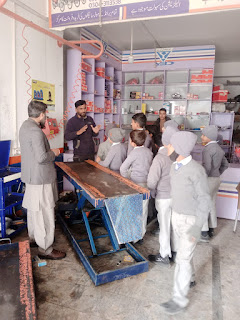Conceptual Education | Tour to Moter Cycle Workshop
Motorcycle mechanics involves
understanding the various components and systems that make up a motorcycle, as
well as the principles behind their operation. Here's some basic engineering
knowledge related to motorcycle mechanics:
Engine Basics:
Motorcycles typically have internal
combustion engines, where fuel is mixed with air and ignited to produce power.
Common types include single-cylinder, twin-cylinder, and multi-cylinder
engines.
The engine's four-stroke cycle
consists of intake, compression, power, and exhaust strokes. Understanding this
cycle is crucial for troubleshooting and maintenance.
Transmission System:
Motorcycles usually have manual
transmissions with a gearbox to control the power delivery to the wheels. Some
models may have automatic transmissions.
Clutches are used to engage and
disengage the engine from the transmission, allowing the rider to change gears.
Fuel System:
Carburetors or fuel injection
systems are used to mix air and fuel for combustion in the engine.
Understanding fuel delivery, air
intake, and combustion processes is important for optimizing performance and
fuel efficiency.
Electrical System:
Motorcycles have electrical systems
for lighting, ignition, and various accessories. Familiarity with the battery,
alternator, and various sensors is essential.
Ignition timing and spark plug
operation are critical for the engine's proper functioning.
Suspension System:
Suspension components, such as forks
in the front and a shock absorber in the rear, are crucial for maintaining stability,
handling, and rider comfort.
Knowledge of suspension adjustments
and maintenance is important for ensuring a smooth ride.
Braking System:
Disc brakes or drum brakes are
common in motorcycles. Understanding how the braking system works and proper
maintenance is crucial for safety.
Hydraulic systems are often used to
transmit force from the brake lever or pedal to the braking components.
Frame and Chassis:
The frame provides structural
support for the motorcycle. Understanding frame geometry and materials is
essential for maintaining stability and handling.
Regular inspection for cracks or
damage is crucial for rider safety.
Tires and Wheels:
Tires play a vital role in traction,
handling, and overall safety. Knowledge of tire types, pressure, and tread wear
is essential.
Wheel alignment and balancing are
crucial for optimal performance.
Routine Maintenance:
Regular maintenance tasks include oil
changes, air filter replacements, chain adjustments, and valve clearance
checks. Following the manufacturer's recommendations is important.
Troubleshooting:
Diagnosing and fixing issues, such
as engine misfires, electrical problems, or unusual sounds, requires a
systematic approach and a good understanding of the motorcycle's systems.
Always refer to the motorcycle's
service manual for specific information and guidelines. Additionally, practical
experience and hands-on training are valuable for becoming proficient in
motorcycle mechanics.
Student of TIME School System Rawalpindi and TIME School System Burma Town Islamabad Visit motercycle Workshop to explore the engineering components of moter cycle.

.jpeg)
Comments
Post a Comment